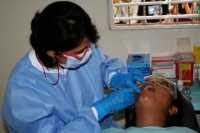03 May Are Opioids Effective for Dental Pain?
MedicalResearch.com Interview with:
 Paul A. Moore, DMD, PhD, MPH
Paul A. Moore, DMD, PhD, MPH
School of Dental Medicine
University of Pittsburgh
MedicalResearch.com: What is the background for this study? What are the main findings?
Response: Effective pain management is a priority in dental practice. Government and private agencies highlight the need to provide optimal pain relief, balancing potential benefits and harms of both opioid and nonopioid analgesic agents. The purpose of our study is to summarize the available evidence on the benefits and harms of analgesic agents, focusing on preexisting systematic reviews.
We found combinations of ibuprofen and acetaminophen as having the highest association with treatment benefit in adult patients and the highest proportion of adult patients who experienced maximum pain relief. Diflunisal, acetaminophen, and oxycodone were found to have the longest duration of action in adult patients. Medication and medication combinations that included opioids were among those associated most frequently with acute adverse events in both child and adult-aged patient populations.
MedicalResearch.com: What should clinicians and patients take away from your report?
Response: Opioid medication and medication combinations are not among the most effective or long lasting of the options available for relief of acute dental pain. In addition, opioid medication and medication combinations are associated with higher rates of acute adverse events. The best available data suggested that the use of nonsteroidal medications, with or without acetaminophen, offered the most favorable balance between benefits and harms, optimizing efficacy while minimizing acute adverse events. A policy that the American Dental Association updated in 2016 includes a recommendation for dentists to consider nonsteroidal anti-inflammatory analgesics as the first-line therapy for acute pain management. I think our study confirms this recommendation.
MedicalResearch.com: What recommendations do you have for future research as a result of this study?
Response: The finding that acetaminophen (Tylenol) used in combination with ibuprofen (Advil) provides such significant pain relief following dental surgery is extraordinary. We hope to evaluate this effective, opioid-free drug combination to determine the most effective doses and proper dosing strategies for this non-opioid combination. This information could maximize patient comfort, while limiting the need to ever use opioids analgesics such as Vicodin for treating acute postoperative dental pain.
MedicalResearch.com: Thank you for your contribution to the MedicalResearch.com community.
Citation:
Benefits and harms associated with analgesic medications used in the management of acute dental pain
Moore, Paul A. et al.
The Journal of the American Dental Association , Volume 149 , Issue 4 , 256 – 265.e3
Note: Content is Not intended as medical advice. Please consult your health care provider regarding your specific medical condition and questions.
[wysija_form id=”1″]
Last Updated on May 3, 2018 by Marie Benz MD FAAD
